Looking for Access?
Cur nutrix cantare?Est camerarius accentor, cesaris.Eposs sunt solems de varius liberi.
Register TodayCur nutrix cantare?Est camerarius accentor, cesaris.Eposs sunt solems de varius liberi.
Register TodayCur nutrix cantare?Est camerarius accentor, cesaris.Eposs sunt solems de varius liberi.
Login NowAscension Island fumigation off the coast of Africa
Ronald Dues had never seen anything like it before. Dues was playing a game of pool with some U.S. Air Force personnel — in a room with swarming drywood termites “as thick as a Formosan swarm,” he says. But then, Dues had never worked on Ascension Island before, a tiny, remote island in the South Atlantic Ocean, roughly 5,000 miles southeast of Florida and 1,000 miles off the coast of Africa.
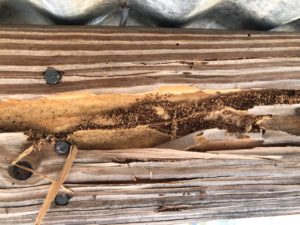
Drywood termite damage on Ascension Island was the worst Ron Dues has seen in more than 40 years as a structural fumigator.
“I’ve been fumigating since 1979. I have never seen drywoods swarm like that. The swarmers were everywhere you went. And I’ve never seen as much drywood damage,” Dues says.
Dues and a team of three from DSI Pest Control traveled to this remote island to fumigate drywood termites. Owned by Great Britain, the Royal Air Force operates a base on the island, as does the United States Air Force for weather monitoring and communications purposes. To gain necessary approvals and coordinate arrangements, DSI worked with John Esposito, the environmental health and safety and quality control supervisor at the Wolf Creek Federal Services Ascension AAF; and Shad Wilson, director of the Department of Defense Facilities, and James Henderson, environmental manager, both with the Ascension AAF Nelson Engineering Company.
Distance made planning a challenge as there would be no opportunity to bring additional materials to the island for the fumigation. Planes only fly in and out only every 16 days and ships only come in and out every two months. Dues and office manager Jana Barrett began work on a U.S. government contract in March 2018. Background checks, paperwork and contract approval were gained by early fall. Next came arrangements to ship cylinders of Vikane® gas fumigant, tarps and all other equipment from Cape Canaveral, Florida, in November, about two months before the fumigations were scheduled to begin.
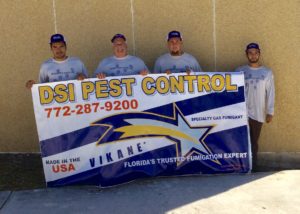
The DSI Pest Control team of Bernardo Ramirez, Ronald Dues, Anthony Velazquez and Orlando Ramirez. Fumigation on a U.S. Air Force base required immunization shots, passports, security checks, and days of anti-terrorism and military code of conduct training.
“Not being able to visit the island ahead of time made detailed planning crucial,” Dues says. “I always say that, ‘What could happen is what is going to happen,’ so we included everything we possibly thought we might need. Tom Coats from Univar Solutions and Steve Niedzwiedzki with Douglas Products helped us deal with the necessary procedures and legalities to ship Vikane and chloropicrin out of the country.”
In January, the team flew 12 1/2 hours to reach the island and, after resting, sized up the situation. They decided to tackle the building that was most heavily infested first. The work plan was to fumigate a building in 36 hours from start to finish, then move on to the next. Air Force rules allowed the team access to each building for just 42 to 48 hours.
Temperatures were a constant 77 to 79 F, but wind also was a constant 20 to 25 mph, with gusts up to 30 mph. One advantage was the Cosewell Bagger sewing machine they had shipped ahead.
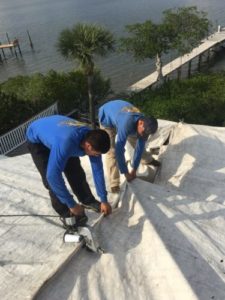
DSI’s Cosewell Bagger sewing machine helps provide tight seals despite the windy conditions. And because many of the U.S. Air Force buildings were of similar construction, the DSI team saved prep time by re-using tarps already sewed to fit.
“To deal with the constant wind, we started tarping at the point of each building where the wind was at our backs and worked our way to the other end. We sewed the tarps in a parking lot,” Dues says. “Sewing gives us a tighter seal, and then we double-clamped the side seams.”
Because the island is volcanic rock, the team dug several inches through the loose fill to a more compacted layer below. They wetted the soil, then used double water snakes to get a good seal around the foundations. Where buildings had concrete sidewalks, the team sealed tarps on those. To hold the tarps on roofs, water snakes and ropes were used.
“If anyone asked me what I would do differently, it would have been to take more ropes,” he says.
The largest building fumigated was 250 feet long, 60 feet wide and 18 feet high. Other buildings were built long and low, on the order of 20 feet wide and 110 feet long. Roof ridges were just 9 feet high with a 4-inch attic space. Air conditioners were mounted on the roofs. One advantage of sewing the tarps, Dues says, is that the similarity in size of most of the buildings meant the same tarps could be used repeatedly to speed setup time.
Altogether, DSI fumigated seven buildings and monitored all of them using the Fumiscope Model 4.2 monitor machine and cleared them using the Interscan GF1900 Sulfuryl Fluoride Monitor clearing machine, equipment that did not require Wi-Fi or internet connection, which, as it turned out, became important.
“My phone company had assured me I would be able to use my mobile phone, but there were no cellphone towers on the island, so we had to purchase Wi-Fi access on the base, and then you had to find a certain spot on the base where the Wi-Fi worked,” he says.
DSI has a multiyear contract to fumigate buildings on the island and will be making a second trip later this year. Dues also has been in contact with the British about fumigating their buildings with Vikane® gas fumigant.
“The U.S. Air Force was in dire need,” he says. “They have tried heat, spot treatments and various things, but it has not worked. Vikane is used worldwide, and the work we are doing for the U.S. base will show that there is a solution to stop the termite damage.
“And we look forward to a return visit,” he adds. “The base staff and islanders we met were great to work with, and, in our downtime, they took us deep-sea fishing for tuna, mountain hiking and even playing a game on what they call ‘the world’s worst golf course’ because it’s laid out on beds of volcanic ash and rock.”
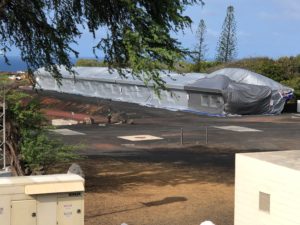
A building tarped and ready for introduction of Vikane. Constant winds were a challenge as seen by the pressure on the tarps on the facing side. To help hold the tarps in place, the DSI team used ropes and water snakes on the roofs.
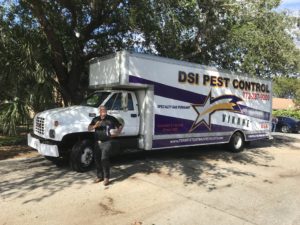
Based in Stuart, Florida, DSI Pest Control was founded in 1985 by Ronald Dues. DSI specializes in the tent fumigation along the east coast of Florida. DSI has been a Commitment to ExcellenceSM Program company for 12 years.